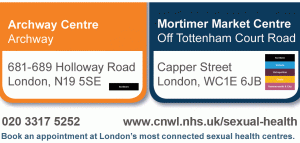Dr Laura Waters is an HIV and sexual health consultant at the Mortimer Market clinic and the Boyz Doc. Dr Laura answers your questions and reports on sexual health every two weeks in Boyz. If you have a question for Dr Laura please email her at [email protected]
Dear Dr Laura,
I’ve never had problems getting hard before but recently it’s been a real issue and it’s starting to put me off trying to have sex. Why has this happened to me? I’m only 25!
Alan
Dear Alan,
First of all, this is very common. Difficulty getting, or staying, hard is also called ‘erectile dysfunction’ (ED) or the other common name is ‘impotence’. Basically if you can’t stay hard enough to have the sex you want to have then that’s ED. Although ED is more common as you get older, 1 in 4 cases are in men under 40 and one study showed almost 1 in 10 men in their 20s experience ED. Whatever your age the causes of ED can be divided into two main groups: physical and psychological. The younger you are the less likely it is that your difficulties with erections are caused by a physical problem.
The first place to start with ED is the brain – signals from the brain trigger the physical changes leading to increased blood flow to the penis and an erection. If you are stressed, or suffer from anxiety of depression, this can affect your desire or libido (meaning you don’t feel like having sex) or, even if you do feel desire, can interfere with your ability to get hard or stay hard. Anxiety is one of the commonest causes of ED in young men and once you’ve experienced ED you can end up in a cycle of worrying about your sexual performance, which makes you more anxious, which makes the ED worse etc. etc. Past negative sexual experiences or abuse, relationship problems or being in a new relationship can all contribute to anxiety around sex and ED.
Lifestyle factors are also important causes of ED – smoking, being overweight and excessive alcohol can all affect your erection. Do you cycle a lot? Men who cycle for more than 3 hours a week may be more likely to get ED so if stopping cycling for a few weeks makes things better this could be the reason. Adjusting your cycling position or bike seat can help. Recreational drugs can also cause ED; marijuana, cocaine can be culprits, as can the drugs that are commonly associated with ‘chem sex’ like crystal meth and mephedrone. Although these drugs are often taken to heighten desire and ability to have sex they can have the opposite effect which is why a lot of men end up using drugs like Viagra to help. Also, if you rely on chems then it can be difficult to have ‘sober sex’ and achieve an erection without chemical stimulation.
Prescribed drugs can also be associated with ED; potential culprits include antidepressants, hay fever medications, blood pressure treatments and drugs used to treat stomach ulcers. Speak to your GP since a change in medication, or even a different dose, might solve the problem.
Physical causes of ED include:
- Hormonal imbalance such low testosterone, or underactive thryoid can cause ED; using steroids and eating disorders can both cause hormone deficiency leading to ED. If you’ve noticed changes such as loss of body hair, smaller testicles or breast enlargement it’s particularly important to get your hormone levels checked.
- Vascular disease: blockage or narrowing of the blood vessels that supply the penis can cause ED; ED can be an early sign of heart disease but uncommon in younger age groups.
- Diabetes: can cause ED by affecting the blood vessels or nerves that supply the penis.
- Anatomical causes: a very tight foreskin, tight frenulum (the bit of skin that joins the foreskin to the shaft of the penis) or Peyronie’s (a condition that causes the penis to bend) can result in ED.
Physical causes are more likely if you never get a ‘normal’ erection; if you get morning erections or manage to get an erection when masturbating then a physical cause is much less likely.
So what should you do? The NHS Choices website is good and your GP will be able to offer advice including whether you need tests to exclude physical causes. Sexual health services can offer advice but unfortunately the ongoing cuts to funding have reduced the options for specialist advice so your GP may be a better bet. There are lots of private clinics online – some of my sexual health colleagues run a clinic that offer services including online workshops http://thehavelockclinic.com/. If you think chems could be an issue then 56 Dean Street’s website is excellent http://dean.st/chemsex-support/.
Finally, what about treatment? The first thing should be to try and address any underlying causes and review your lifestyle. Medications can help, regardless of the cause, and Viagra and other similar drugs are commonly used; these work by improving blood flow to the penis.
Speaking to your GP or another professional if you want to try ED drugs, especially for the first time. ED drugs can interact with other medication, including some HIV meds and recreational drugs (including poppers), so always check first. A lot of pharmacies sell ED drugs online – I’d advise using a reputable pharmacy – this website tells you more http://www.nhs.uk/chq/Pages/882.aspx. You should avoid ‘herbal viagra’ – the MHRA, an agency that oversees medication safety, after tests showed that several so-called herbal remedies actually contained genuine Viagra. You could end up taking real ED drugs at an unknown dose so it’s safer to get genuine drug from a reliable source.













